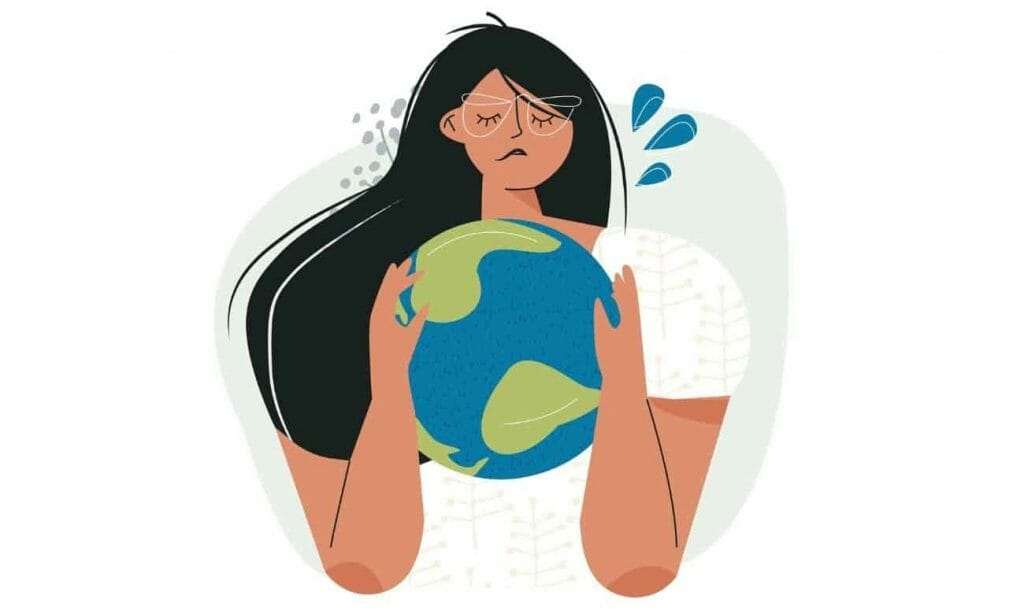What keeps you up at night? Work worries? Stressful family issues? Arguments with your partner? The stressors of the world are endless with cut-to-cut deadlines, money problems, relationship drama or even health issues but some of us face sleepless nights over a larger, universal issue, the state of the planet and our conscious decisions towards making it better or worse. This stress over environmental crises like climate change, natural disasters, ecological calamities, deforestation, loss of biodiversity and more is known as eco-anxiety. This anxiety comes because of the current and predicted future state of the planet and how humans have driven climate change drastically.
What is eco-anxiety?
Let’s break it down further. The year 2020 brought the biggest pandemic humans on earth ever faced and with it brought light to a larger climate crisis and a sense of awareness amongst those who were blissfully unaware of the current state of our planet. It added to the anxiety around environmental issues that stem from the swiftly emerging risk of disastrous ecological events, fears for the future generation and feelings of helplessness.
Okay, while we can’t put all the blame on 2020, eco-anxiety actually stems back to Sir David Attenborough and his work. His award-winning series on the ocean crisis, Blue Planet II, brought to light the extent of what had transpired in the past years. It shifted the attention to a larger picture and the ball started to roll from that point in time. Falling on then 16-year-old Greta Thunberg who started a revolution with the school strikes and here we are now.

However, doctors don’t consider it a diagnosable condition just yet. Instead, eco-anxiety tackles a person’s psychological relationships with nature and how it affects their individuality, physical, mental and emotional health. The immediate effects of an environmental crisis such as loss of livelihood and damage to communities, loss of income can cause mental harm while significant impacts like a rise in sea levels, a rise in global warming, increase in carbon emission can lead to mental as well as physical health symptoms.
So, how do you know if you’re suffering from eco-anxiety?
Eco-anxiety can manifest into several mental illnesses such as:
- Trauma
- Post-traumatic stress disorder (PTSD)
- Anxiety
- Depression
- Anger
- Reduced feelings of control
- Increased feelings of helplessness and fear
With eco-anxiety, many may also experience general symptoms of anxiety. Severe stress, caused by any issue, can lead to health problems such as heart conditions, high blood pressure and depression. While there is no medical thesis on why we face eco-anxiety and no medication insight, it’s natural for a person to feel concerned about the environment and for it to interfere with their day-to-day lives. If you think that this is a concern of yours that needs to be addressed, consult a health professional or a psychologist.
How can you manage eco-anxiety?
Unless we really change ourselves, we can’t change the planet. The smaller steps accumulate to make a larger impact. You can’t rely on societal change, governmental regulation and corporate responsibility before you take a good look at yourself. Our contributions add to the climate crisis and once we correct ourselves, only then can we campaign change.
1. Be accountable
You’ll notice a difference in yourself when you start consciously choosing your actions. The simplest steps of not shopping unnecessarily, eating sustainably, avoiding plastic and waste and keeping an eye on your waste emission can make a massive difference.
2. Get educated
The world is a vast, vast place. We have access to an array of information but unfortunately, this also makes us susceptible to being misinformed. Getting accurate information on environmental disasters can make us feel motivated and empowered to make a change. It can also arm us with the knowledge of what steps to take next, to make the situation better.
3. Trust your resiliency
Most of us don’t trust ourselves and our ability to overcome stress and loss. This leads to increased anxiety and a sense of helplessness as we end up viewing every problem as unsolvable. Instead, if you show confidence in your resiliency to bounce back, you’ll reduce your risk of depression and PTSD. Try connecting with like-minded people who care about the planet as much as you do, to find strength in social settings. Also, always foster personal relationships that bring love, trust and peace and focus on yourself, your health and building a positive self-image.
4. Foster a connection with nature
Spending time outdoors, taking walks in nature or indulging in adventure activities can help strengthen your connection with nature, alleviating eco-anxiety. Our mind naturally feels relaxed when surrounded by nature and letting this positivity engulf you can help ground us.

4. Take action
If your eco-anxiety issues feel too large to face, break them down into smaller problems. Tackle one at a time but take action. Taking action in small measures allows you room to evolve and motivates you to push further gradually. It can also help you combat that feeling of being stuck between ‘wanting to do more’ and ‘what difference can a single person make’. So, you’ve changed your habits at home into sustainable ones, what can you do next? Start by:
- Banking ethically
- Travelling consciously
- Educating others on eco-anxiety and the climate crisis
- Shopping sustainably, especially fashion
These steps may seem trivial to you, but trust us, big changes can only happen if smaller, more necessary changes are taking place. Your steps will inspire others to champion change as well, starting a movement that could save our planet.
Read more: Setting Boundaries To Let Go Of Anxiety
Like & Follow ThinkRight.me on Facebook, Instagram, Twitter, and Telegram to stay connected.






























